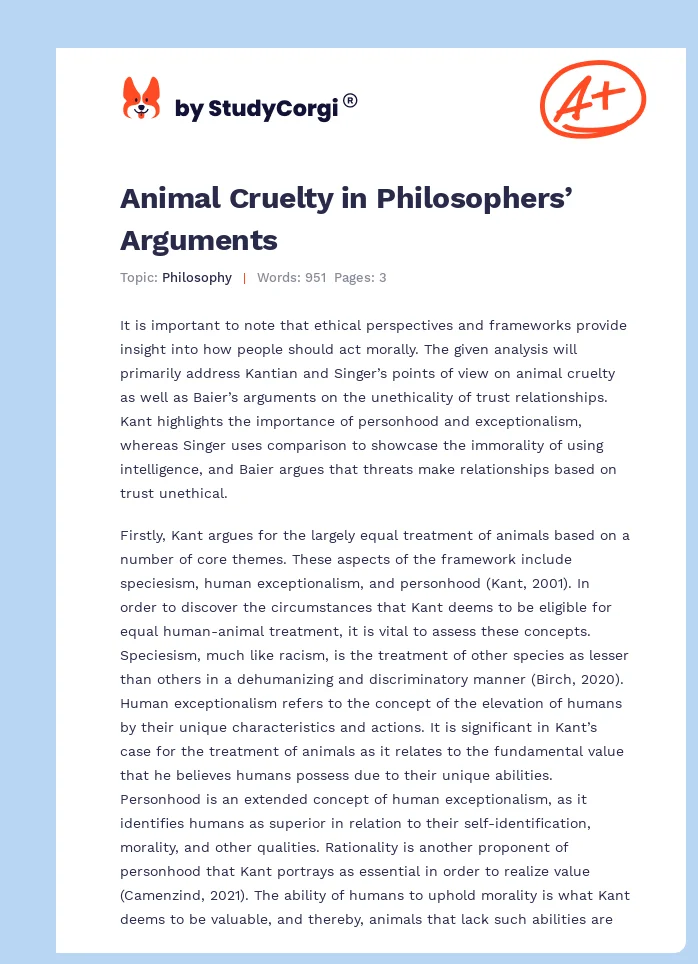The debate surrounding animal cruelty often converges around the contentious notion of speciesism—a term coined by philosopher Richard Ryder to describe the preferential treatment extended to certain species over others purely based on species membership. Just as racism and sexism are predicated on unfounded biases against individuals, speciesism suggests that humankind’s dominion over animals is grounded in sociocultural constructs rather than any intrinsic superiority. This leads us to ask: Is animal cruelty an embodiment of speciesism, and what do philosophers have to say about animal rights within this context?
To understand the interplay between animal cruelty and speciesism, we must first delve into the essence of ethics and morality. Ethics, at its core, forms a framework through which we gauge right and wrong, often sparking dialogues that stretch across various modalities of life. In an environment where such frameworks are traditionally anthropocentric, the inclusion of non-human animals remains astonishingly scant. This myopic view, wherein humanity stands at the helm of moral consideration, triggers a cascade of violent behaviors manifesting as animal cruelty.
Animal rights philosophers argue that it is inherently unjust to subordinate one group of sentient beings—animals—based solely on their species. Peter Singer, a pivotal figure in this discourse, posits in his seminal work, “Animal Liberation,” that suffering is not confined by species—what matters ethically is the capacity to suffer. Utilizing a stark metaphor, one might compare this ethical consideration to a vibrant tapestry wherein each thread, irrespective of color, plays a crucial role in the overall design. Removing or neglecting any thread diminishes the entire fabric, much like the suffering of one being diminishes the moral fabric of humanity.
Moreover, Tom Regan, another influential animal rights philosopher, advances the notion that animals possess inherent value independent of their utility to humans, thereby rejecting the idea that animals are mere resources for human exploitation. Regan’s perspective illuminates the concept of inherent worth, arguing that to diminish an animal’s rights due to its species is akin to declaring certain humans unworthy due to arbitrary factors like race or gender; both are ethically indefensible and morally repugnant.
At the crux of the speciesism debate is the concept of sentience—the capacity to feel pleasure, pain, and emotions. Philosophers emphasize this shared capacity among different species, a trait that should prompt us to reevaluate our moral obligations. The ethical landscape, characterized by intersections of suffering and rights, implores us to acknowledge that non-human animals navigate a world rife with harm, often at the hands of their human counterparts. This realization uncovers an uncomfortable truth: we often turn a blind eye to the compassion and sentience of beings who share our planet simply because of their species identity.
The implications of speciesism extend into myriad domains, including agriculture, entertainment, and scientific research, where animal cruelty is often rationalized by cultural norms and economic interests. Our society often views animals as tools, merely existing to prop up human demands. This instrumental view paves the way for egregious acts against animals, whose interests and well-being remain overshadowed by human convenience. For example, factory farming practices render millions of sentient beings to lives filled with misery, all justified in the name of efficiency and profit—a grim reflection of deep-seated speciesist ideologies.
Counterarguments to the notion of speciesism typically revolve around the idea of human uniqueness—our cognitive abilities and social structures are vastly different from those of animals. However, this argument falters under scrutiny, as uniqueness does not equate to superiority or moral entitlement. By positing human exceptionalism at the center of ethics, we risk relegating beings who experience suffering to subservient roles, a dichotomy that philosophers fiercely challenge. As highlighted in the works of philosopher Regan, our moral obligations should not pivot on arbitrary hierarchies of species, but rather on the shared experience of suffering.
One intriguing metaphor that encapsulates the strain of speciesism is the “fruit basket of life,” where each fruit—a metaphor for each species—contributes to the richness and diversity of our planet. Imagine an empty basket, or one filled only with selects from one variety; it would lack vibrancy, flavor, and nourishment. Similarly, when we fail to honor the lives and rights of animals, we strip our world of its richness, relegating it to a barren landscape devoid of moral integrity.
The urgency of amicably addressing speciesism and animal cruelty comes into sharp focus when we consider the potential for change. Social movements advocating for animal rights, alongside philosophical discourses, serve to galvanize a growing awareness. Initiatives like humane education, veganism, and legislation aimed at safeguarding animal welfare signal a burgeoning recognition that our treatment of animals is a reflection of our societal values—values that merit constant examination.
In conclusion, the relationship between animal cruelty and speciesism is inexorably intertwined, challenging us to reconcile our ethical frameworks. As we hear the silent pleas of countless creatures subjected to ill-treatment, we are confronted with our moral duty to transcend our speciesist biases. Animal rights philosophers provide essential insights, urging a shift from oblivion to awareness. As we navigate this complex terrain, let us aspire to cultivate a world where the value of life extends beyond species delineations, creating a tapestry rich with compassion, respect, and justice for all sentient beings.








